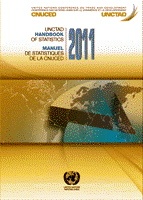
In the last decade, commodity prices increased by an average of 12.2% per year – some commodities rose more than three fold during that period (from 2001 through 2010). The price of rice rose by an average of 15% per year during the period, indicating real pain for even those who could afford the rice, a staple food for much of the globe’s population – according to the UN Conference on Trade and Development (UNCTAD) annual “Handbook of Statistics,” a wide-ranging survey of numerical information on international trade flows, commodity prices, maritime transport, and the economic performances of developing countries.
Unprecedented Year of Spikes & Volatility:
In contrast, the two previous decades witnessed a relatively stable or muted increase in commodity prices: 0.5% per year from 1981 through 1990 and a decrease of 1.3% per year from 1991 through 2000. The rise of developing economies as China and India only in part explains this decades spikes and volatility. In fact, some population segments of some developing countries have undoubtedly benefited from the rise in Latin America, Asia and even in Africa. However, this has been more than offset by rising hunger among the working poor and otherwise impoverished including farmers who might be expected to benefit. Almost a billion people each day go hungry to bed and the benefits of commodity prices are more likely to reach big producers, middlemen and speculators. Read: -“State of Food Insecurity in World 2011” -
diplomaticallyincorrect.org/films/blog_post/state-of-food-insecurity-in-world-2011-un-report-by-ambassador-mo/36153.
Financial Speculation as Price & Volatility Driver:
Part of the problem is the volatility itself – the average price rises per annum do not reflect the significantly more pronounced osciltation. It makes it more difficult/costly to establish plans for planting. Also, the rise of certain commodities as petroleum, which has witnessed one of the highest spikes, also adds to the cost of fertilizer and delivery of food staples. The issue has not been production shortages but rather speculation as well as delivery. Speculation has resulted in waste where in some instances food has actually rotted in warehouses, purposefully or by miscalculation. For example, after a recent spike in rice prices, the Philippine Government purchased tons of rice at premium prices – only to have most of that rice go to spoil. I have no doubt that prices are being pumped up and down in waves of speculation or perhaps manipulation, as some ascertain. Regardless, it is evident that neither actual production shortages nor consumer demand are price drivers necessarily. Read: - “Greed is Good – Abuses in Financial Markets Cause for Spiking Prices & Economic Instability” -http://diplomaticallyincorrecttv.com/films/blog_post/greed-is-good-abuses-in-financial-markets-cause-for-spiking-prices-economic-instability-by-ambassador-mo/35002
Globalization:
Globalization also may be more part of the problem rather than the solution according to some – including the UN Special Rapporteur on the Right to Food Olivier DeSchutter. Read: -
diplomaticallyincorrect.org/films/blog_post/globalizations-big-losers-small-farmers-food-security-you-by-ambassador-mo/42949.
Will Economic Spikes Translate into Political Volatility?
While much of the recent blame has been passed to the collapse of the US housing and mortgage markets – a “bubble” as some have called it, I’m convinced that this was more a back end effect incited by unsustainable spikes in everything from petroleum to food staples. The collapse of the housing market in most but not all global centers as well as the US clearly has been the biggest drag, but not necessarily the trigger. It has also served to detract focus from other speculative endeavors in the financial markets that had and continue to benefit some. Regardless, prices of food and energy rising at 10% per year higher than wages in most developed countries along with the widest wealth gap in almost a century is unsustainable in terms of global economic health or political stability. Read: - “Income Gap Highest in 30+Years” -
diplomaticallyincorrect.org/films/blog_post/income-gap-highest-in-30-years-us-on-more-extreme-by-ambassador-mo/4233.
See our 3 Part Interview – “WhyHunger @UN-Asking Questions & Seeking the Answers – Part 1” -
diplomaticallyincorrect.org/films/movie/whyhunger-un/29316.
UNCTAD “Handbook of Statistics” Link -
www.unctad.org/Templates/webflyer.asp?docid=16171&intItemID=5772&lang=1
By Ambassador Muhamed Sacirbey
Facebook – Become a Fan at “Diplomatically Incorrect”
Twitter – Follow us at DiplomaticallyX
“International Financial Crisis Channel” -
diplomaticallyincorrect.org/c/international-financial-crisis

